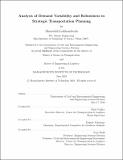Analysis of demand variability and robustness in strategic transportation planning
Author(s)
Lokhandwala, Ahmedali (Ahmedali Abbas)
DownloadFull printable version (7.523Mb)
Other Contributors
Massachusetts Institute of Technology. Dept. of Civil and Environmental Engineering.
Advisor
Chris Caplice.
Terms of use
Metadata
Show full item recordAbstract
Creation of a long-term strategic transportation plan is critical for companies in order to make informed decisions about fleet capacity, number of drivers needed, fleet allocation to domiciles, etc. However, the inherent demand variability present on a transportation network, in terms of weekly occurrences of lane volume, results in emergency weekly shipments that deviate from the long-term plan. This leads to a sub-optimal weekly execution, resulting in higher overall costs, compared to initial projections. Hence, it is important to address this variability while creating a strategic plan, such that it is robust enough to handle these variations, and is easy to execute at the same time. The purpose of this thesis is to create a stochastic annual plan using linear programming techniques for addressing demand variability, and prove its robustness using simple heuristics, so that it is easy to execute at an operational level. Through the use of simulations, it is shown that the proposed planning methodology is within 6% of the optimal solution costs and handles 71% of the demand variability occurring on a weekly basis, making it easy for operational managers to execute. Thus, the proposed plan reduces the optimality gap between long-term planning and weekly operations, creating a tighter bound over the projected versus actual costs incurred, which helps develop a better transportation strategy.
Description
Thesis (M. Eng. in Logistics)--Massachusetts Institute of Technology, Engineering Systems Division; and, (S.M. in Transportation)--Massachusetts Institute of Technology, Dept. of Civil and Environmental Engineering, 2010. This electronic version was submitted by the student author. The certified thesis is available in the Institute Archives and Special Collections. Cataloged from student-submitted PDF version of thesis. Includes bibliographical references (p. 121-122).
Date issued
2010Department
Massachusetts Institute of Technology. Department of Civil and Environmental Engineering; Massachusetts Institute of Technology. Engineering Systems DivisionPublisher
Massachusetts Institute of Technology
Keywords
Engineering Systems Division., Civil and Environmental Engineering.